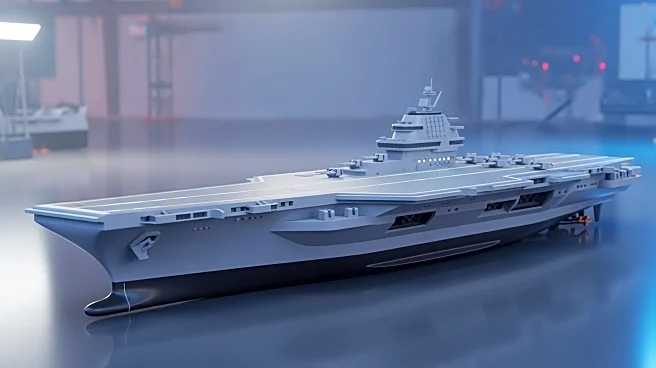What's Happening?
The aircraft carrier John F Kennedy (CVN 79), currently under construction at Newport News Shipbuilding, is expected to begin sea trials by the end of the year. Chris Kastner, CEO of HII, provided updates
during a third-quarter financial results call, highlighting progress in the testing program for the Kennedy. The ship's delivery has been delayed due to modifications required to accommodate F-35C aircraft and other changes. Initially planned for delivery in two phases, the ship will now be delivered as a single unit. The delivery date has been shifted to March 2027 from the previously anticipated July 2025, to allow for the completion of Advanced Arresting Gear certification and continued work on Advanced Weapons Elevators.
Why It's Important?
The construction and delivery of the John F Kennedy aircraft carrier are significant for the U.S. Navy's operational capabilities, particularly in terms of accommodating advanced aircraft like the F-35C. Delays in delivery could impact the Navy's strategic planning and readiness. The modifications and testing are crucial to ensure the carrier meets modern combat and operational requirements. The progress and challenges faced by Newport News Shipbuilding reflect broader issues in military procurement and construction timelines, which can affect defense readiness and budget allocations.
What's Next?
The next steps involve completing the sea trials and addressing the remaining construction and certification tasks. The shipbuilders are focused on installing large components and accelerating erection progress for the Enterprise (CVN 80), another carrier under construction. The U.S. Navy will continue to monitor the progress and adjust timelines as necessary to ensure the carrier meets all operational requirements. Stakeholders, including Congress and military leaders, will likely continue to scrutinize the project's timeline and budget implications.
Beyond the Headlines
The delays and modifications required for the John F Kennedy highlight the complexities involved in modern military shipbuilding, including the integration of new technologies and systems. These challenges underscore the importance of flexible planning and adaptive strategies in defense procurement. The ability to accommodate advanced aircraft like the F-35C is crucial for maintaining air superiority and operational effectiveness in future conflicts.










